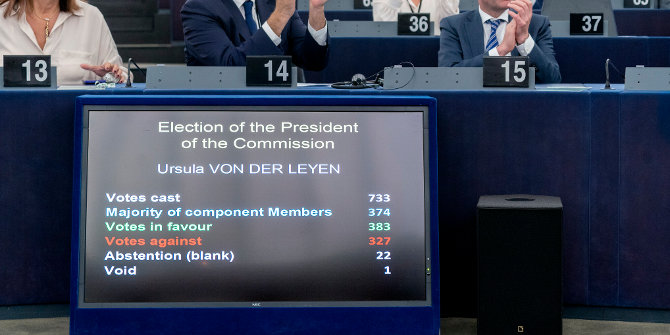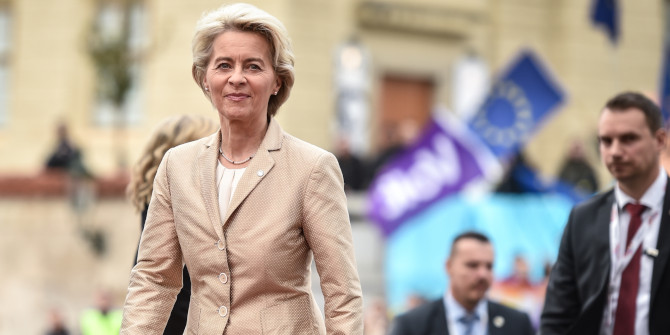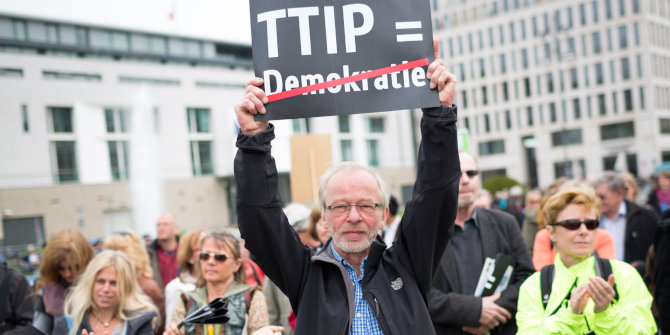Does the framing of a crisis change the willingness of citizens to provide support to neighbouring countries? Drawing on a new study, Waltraud Schelkle, Zbigniew Truchlewski and Federico Ferrara find a clear link between the way a crisis is framed and citizens’ support for solidarity.
In spring 2020, during the first wave of the COVID-19 pandemic in Italy, the Bild-Zeitung published an open letter to Italian citizens, in both German and Italian. It assured them that “We are with you! We weep with you… Without you, the German economic miracle would not have been possible.” (own translation).
This was the sentimental version of what Chancellor Merkel said in an interview for six national newspapers in May 2020, that “[T]he coronavirus pandemic is confronting us with a challenge of unprecedented dimensions. It has struck us all indiscriminately… For Italy and Spain… the coronavirus pandemic signifies a huge burden in economic, medical and… emotional terms. In these circumstances, it is only right for Germany to think not just about itself but to be prepared to engage in an extraordinary act of solidarity. It was in that spirit that French President Emmanuel Macron and I made our proposal”.
The pandemic was portrayed as a common shock for which none of us had been responsible and which was very severe for all of us. Merkel’s statement echoed what nine countries from southern and western Europe had earlier said in an open letter making the case for a common debt instrument, dubbed the Coronabond.
Yet a decade earlier, Bild-Zeitung – which has the largest circulation of all newspapers in Germany – had slandered “greedy Greeks” for demanding billions of grants and ripping off the German taxpayer during its sovereign debt crisis. This echoed, in the rudest possible way, what Finance Minister Schäuble and Eurosceptic economists had insinuated. The contrast between the framing of the COVID-19 pandemic and the framing of the Eurozone crisis could not be starker.
Frames and support for solidarity
Do such different ways of presenting a case for transnational solidarity matter? Do citizens respond to the framing of a crisis and support financial help to hard-hit neighbours depending on how the plight of that other country is portrayed – like Italy in 2020 or like Greece in 2010? And does it matter what form support for another country takes, be it a gift or a loan?
These are the questions we try to answer in a new study. We argue, based on speeches by national representatives, that there are three important frames which were invoked in the two extreme crisis scenarios. On the one hand, there was the COVID-19 pandemic narrative: Merkel characterised the crisis as common, non-attributable and existential. On the other, there was the Eurozone crisis narrative in countries like Germany and the Netherlands and even in the scholarly literature: this was supposedly a sovereign debt crisis of a few countries like Greece that had lived beyond their means; and it should be their own problem to deal with it as it did not concern the rest of the Union.
Never mind that banks in the rest of the EU had happily lent into the public and private spending spree that secured employment in export industries. Or that Greek citizens had never demanded, let alone got, lavish gifts. All the German – and other, including Italian – taxpayers were enlisted to do by their governments was to guarantee the bond issue with which the European Stability Mechanism raised the loan for the Greek government, in case Greece could not pay back. Even when Greece defaulted, these guarantees were not called; private banks had to take a steep cut on their claims against the Greek government.
A survey experiment
Both crises were framed in particular ways. To examine how these framings affected support for solidarity, we conducted a survey experiment in which we changed the baseline scenario of the Eurozone crisis narrative as a self-inflicted problem that had only limited implications for the rest of the EU.
Our experimental treatments varied each of these features. We also asked respondents for the specifics of financial help they would support in each scenario, notably if it were financed by joint debt, by a tax increase or given as a grant. The latter proved quite important. To take only the extreme other scenario to the baseline scenario, notably the framing of the COVID-19 pandemic as a common and very severe shock for which past policies could not be blamed:
- If solidarity is financed by raising joint debt, the COVID-19 scenario has the strongest positive effect on respondents’ attitudes towards helping other member states (all other scenarios, varying only one or two features, also had a positive effect).
- If solidarity is financed by a tax increase, there is a small positive effect on the willingness to help compared to the Eurozone scenario (also in three other scenarios).
- If solidarity is financed by a transfer, there is on average no discernible change in respondents’ attitudes between the Eurozone and the COVID-19 crisis scenarios (only two other scenarios have a positive effect).
In short, changing the frame does make a notable difference to solidaristic attitudes. In fact, in almost all northern member states, respondents reacted more strongly to different scenarios than respondents in southern and eastern member states, although solidaristic attitudes in southern Europe are on average stronger to begin with. Finally, the framing of the Eurozone crisis in some northern member states was indeed extremely unfavourable for soliciting voters’ willingness to help other countries.
Support for Ukraine
It is tempting to consider what these findings mean for the attempt to sustain EU voters’ support for Ukraine’s defence against Russian aggression. If our findings also apply to this immediate neighbour of the EU, then it matters less that it is first and foremost a country-specific crisis. It would be more effective for governments to stress that it is not Ukraine’s fault and that it is an existential threat to its nationhood.
If our findings travel, this scenario would have a positive effect on respondents’ willingness to support Ukraine for all three ways in which financial solidarity can be exercised. In fact, the marginal effect of a Ukraine crisis scenario is strongest if solidarity is extended as a transfer. While surprising at first sight, this makes sense: if we are not equally affected, we are able to help; but for our help to be effective, it has to be a generous gift since the country is in mortal danger, through no fault of its own.
We are inclined to see a two-fold message here: do not underestimate citizens’ empathy for others but also be aware that empathy can be undermined by distorted frames. Unfortunately, tabloid journalists seem to know this and exploit it both ways.
For more information, see the authors’ accompanying paper in European Union Politics
Note: This article gives the views of the authors, not the position of EUROPP – European Politics and Policy or the London School of Economics. Featured image credit: S.Vidal/Shutterstock.com





